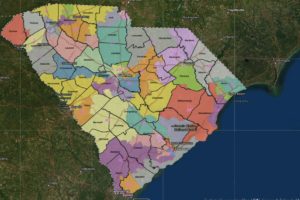
By Andy Brack | When legislators return to Columbia Tuesday, they’ll be drowning in work to do when the House and Senate gavels clack to open the 2022 session.
Not only do they have to deal with three different budgets, but they have to make sure to deal with reapportionment of legislative districts, set primary elections for 2022 and deal with an array of leftover questions from how to deal with mask mandates, education reform, tax fairness, medical marijuana and more.
“There’s not going to be a lot of time to take up more substantive things,” one state senator said.
On display in the midst of all of this will be a culture war that has ramped up in recent years.

“Whether it [a culture war] is real or perceived is up for debate,” said state Sen. Sean Bennett, R-Summerville. “But for many in our society, it is real and that can not be ignored. One thing is for sure: When beliefs are dismissed, it sets a battlefield. Worse, when one shows contempt for another or their ideas, there is no coming back from that.
“I happen to believe that when exposed to the competition of ideas to solve our nation’s problems, ‘my side’ has real solutions to the real problems. And those ideas get better when challenged. I am often frustrated that there are few moments in time when we actually engage.”

Rep. Gilda Cobb Hunter, D-Orangeburg, explained how symbolic issues might get more time than substantive ones in 2022: “The issues that the House is likely to take up and pass unfortunately will be those that follow the national Republican playbook designed to divide rather than build consensus. Transgender students playing in sports; additional restrictions on abortion; anti-vaccine and masks restrictions that will continue to add to the rise in COVID-related hospitalizations and deaths; and bills addressing Critical Race Theory (CRT), even though it is not taught anywhere in the public schools in South Carolina.”
Here’s a look at some of the major – and minor – issues that will take up time as lawmakers race to end the session in June.
Three budgets on tap
In a good year, the General Assembly works to craft a single budget to spend general tax revenue from fees and taxes on sales and income. It’s an arduous process with wrangling and arm-twisting to figure out how to allocate billions of dollars, often including some surplus dollars and new revenues from annual growth in the state.
But in 2022, state lawmakers have two extra budgets to deal with – about $525 million from the settlement of a years-long case with the federal government over the Savannah River Site (SRS) and spending of about $2.5 billion in other federal funds made available to cope with economic fallout from the COVID-19 pandemic.
General fund budget. The state will start the session with about $9 billion in general tax revenues that occur each year. On top of that, there will be an extra $1 billion in new recurring revenues from growth and $1 billion from a surplus. Additionally, lawmakers will have a $1 billion contingency reserve, which essentially will be carried over. Bottom line: Lawmakers will have about $11 billion in funds to start with in the coming year in the regular budget.

SRS settlement. The half-billion-dollar settlement was the result of a lawsuit over storage of plutonium for years at SRS by the U.S. Department of Energy, which agreed to remove tons of it by 2037. In December, Gov. Henry McMaster suggested using the monies for “transformative” projects: “These settlement funds present us with a once in a lifetime opportunity,” he said. By making big, bold, and transformative investments in the areas of education, infrastructure, workforce, and economic development, we can quite literally change the future of the region and the state.” Aiken-area lawmakers say they think the money should be spent in the Aiken region to make up for years of issues related to the nuclear facility.
Pandemic funds. Legislators also will have about $2.5 billion in one-time money from the American Recovery Plan Act to spend on everything from improving health outcomes for South Carolinians, curbing crime and covering losses the state government suffered during the pandemic. Authorized uses also include making investments in water, sewer and broadband infrastructure. Look for big battles on how money could be split, including uses to improve roads.
Redistricting and elections
House members and senators spent the summer and fall working on new election maps for House, Senate and congressional districts. They’ve approved House and Senate maps, but still have to finish work on a congressional map as some complain it is overly gerrymandered to make a Charleston-area congressional district more Republican-leaning that it should be.

The newly redrawn House map faces a federal lawsuit alleging it continues South Carolina’s ““shameful history and ongoing record of discrimination.” It’s unclear whether the Senate map, which many observers view as fairly drawn, will face a lawsuit, but the congressional map is expected to draw a legal challenge.
All of the legal twisting is likely to have an impact on the legislative process. If lawsuits aren’t settled soon, the election primary date may be changed until the fall, which means filing for elections would shift from March to sometime in June. That would mean lawmakers would be looking over their shoulders throughout the 2022 session for potential challengers. And in turn, that would encourage a more partisan environment – which would thwart a lot of meaningful work being done.
Several school issues on tap
Lawmakers will also deal with several measures dealing with whether school districts can require masks to reduce the threat of the COVID-19 virus. In the 2021-22 budget, lawmakers included a controversial proviso to thwart mask use, but it was declared unconstitutional. In 2022, look for arguments over whether the proviso will be codified.
Legislators also will consider at least three other major education issues: Whether to pay teachers more as thousands leave the profession; whether to allow a voucher-like credit for private schools that would siphon money from public schools; and whether to rewrite rules governing how charter schools operate.

“You’re going to see some of the shell games this year,” state Sen. Mike Fanning said at a December forum. “You’ve already heard some of it — sex books in Fort Mill libraries, critical race theory — you’ll hear every single thing thrown out the one year South Carolina has more revenue than we’ve ever had in the history of the state — the one year we’ll have more additional revenue than we will ever have in the next 100 years. … Don’t buy it.”
Other issues on the horizon
Look for these issues to be aired during the session, too:
Abortion. A perennial discussion, especially in an election year, it’s likely that pro-life advocates will push for more abortion restrictions, despite expected rulings from the U.S. Supreme Court.
Medical marijuana. After state Sen. Tom Davis, R-Beaufort, has pushed for years to get approval for medical uses of marijuana to relieve suffering of residents with crippling diseases and conditions, the measure looks like it will get an early airing. Chances reportedly are better this year for passage than ever before.

Elections. Also look for competing proposals on elections. Some want to expand voter access through bills such as H. 3822, while others want more uniform rules to make uniform election processes. “We use the line that a vote in Charleston County needs to be the same as a vote in York County,” said state Rep. Gary Simrill, majority leader of the S.C. House.
Tax reform. Some expect discussions on overhauling the tax code to be fairer may start, but likely won’t be resolved. Others say there could be discussion of income tax bracket changes.
“Other issues of importance but unlikely to get much debate or see the light of day are gun-safety reform and equal pay,” said state Rep. Beth Bernstein, D-Columbia.
- Have a comment? Send to: feedback@statehousereport.com.



This makes me want to pull up the covers and stay in bed. So many people suffering
and those in power plan to do nothing.